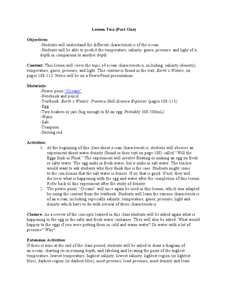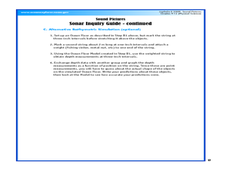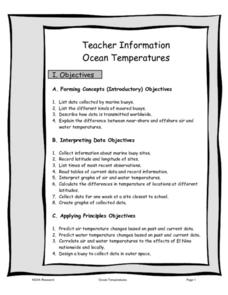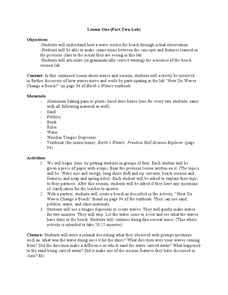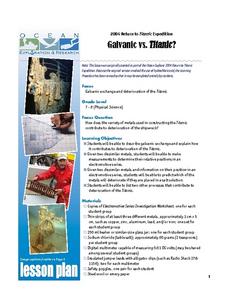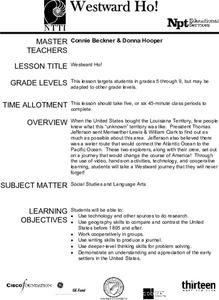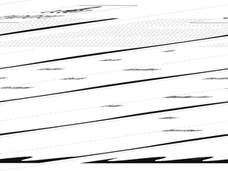Curated OER
Sea State
Learners explain the process of wave formation and analyze the relationship between the ocean and the atmosphere. In this oceans lesson students use buoys to cast real time sea state conditions.
Curated OER
Lesson tow
Learners study the ocean and its characteristics. In this oceans instructional activity students complete a lab activity and are able to predict temperature of certain depths.
Curated OER
Sound Pictures
Students examine the components of a sonar system. In this physical science lesson students explain how multibeam and sidescan sonar systems are useful to ocean explorers. Students simulate sonar operations in an activity using a motion...
Curated OER
Journey To the Unkown
Students explore the ocean rift habitat off the Galapagos through an audio expedition, Internet research on deep sea animals, an explorer game and simulation of the exploration of the deep sea bottom. They focus on the actual NOAA...
Curated OER
Ocean Temperatures
Students list data collected by marine buoys and the different kinds of moored buoys. They describe how data is transmitted worldwide. They explain the difference between near shore and offshore air and water temperatures.
NOAA
History's Thermometers
How is sea coral like a thermometer? Part three of a six-part series from NOAA describes how oceanographers can use coral growth to estimate water temperature over time. Life science pupils manipulate data to determine the age of corals...
NOAA
Oceans of Energy
Are the earth's oceans really just giant batteries, waiting for their energy to be harnessed? Middle school mechanical engineers will be shocked by the amazing amount of energy that forms around them after diving into part four of a...
Curated OER
I, Robot, Can Do That!
Students describe the three types of underwater robots and the advantages and disadvantages of using them. In this underwater lesson students are given a task and identify the best robot for the job.
Curated OER
First European Settlers:Oh, California
Students trace the paths of the early explorers who sent three expeditions to settle California. They analyze possible reasons why the land expeditions took longer than ocean routes.
Curated OER
Great Explorations: To the End of the Earth and Beyond
Students analyze the factors that affect exploration such as religion, trade, territorial expansion, and science. In this Great Explorations lesson, students determine the names of famous explorers as well as their routes and...
Curated OER
Cool Lights
Students investigate how and why deep-sea organisms produce light. They examine how these processes can be used to study deep ocean environments.
Curated OER
How Do Waves Change a Beach?
Learners conduct an experiment on beach erosion. In this earth science lesson, students create a beach model and use tongue depressor to produce waves. They write a journal about their observations.
Ocean Explorer
Architects of the Coral Reef
Coral Reefs are the focus of a life science lesson plan. Upper graders look at how coral reefs are formed, how the animals and plants reproduce, and the variety of ways that humans benefit from coral reefs around the world. Groups of...
Curated OER
It's Going to Blow Up!
Students discover the major characteristics of volcanoes on the Pacific Ring of Fire. They describe the processes that produce the "Submarine Ring of Fire." students explain the factors that contribute to explosive volcanic eruptions.
Curated OER
Ancient Bugs
Students describe Archaea. In this biology lesson, students examine biological communities and the role Archaea plays. Students will compare and contrast the Archaea with bacteria and eukaryote.
Curated OER
Galvanic vs. Titanic?
Young scholars discover how galvanic exchange has contributed tot he deterioration of the Titanic. They perform an experiment in which they predict which of 2 metals deteriorate when placed in a salt solution.
NOAA
Watch the Screen!
Can a sponge cure cancer? Life science pupils visit the drugstore under the sea in the fifth lesson of six. Working groups research the topic then get hands-on experience by testing the inhibiting effects of several plant extracts on E....
Curated OER
Westward Ho!
For any teacher of American History, The Lewis and Clark Expedition is a watershed event that should be shared with your students. This is a very good lesson on the Expedition, and the events that led up to it; including The Lousisiana...
Curated OER
Ecosystems and Remote Sensing
Young scholars obtain remote sensing data to compare and contrast global biomass data with global temperature data.
Teach Engineering
Are We Alone?
Find an answer to the age-old debate of whether life exists on Mars. Groups determine criteria to help look for signs of life on Mars. The activity has the class simulate testing Martian soil samples for signs of life before drawing...
Curated OER
What is a Karst?
Students examine the process that creates limestone. In this limestone lesson students complete a worksheet and participate in a lab activity.
Curated OER
Life is Weird
Students study the organisms that are found in cold seeps and see how they interact with each-other. In this biological organism lesson students describe the major features of cold seeps and the process of chemosynthesis.
Curated OER
This Life Stinks
High schoolers study cold seeps and see how organisms obtain energy from methane. In this sinkholes lesson students examine the relevance of chemosynthesis to communities.
Curated OER
Ups and Downs
Pupils examine tidal currents. In this tides lesson students describe how the tides affect lives and explain why it is important to monitor them.



